How to load a shipping container more efficiently: Tips and best practices
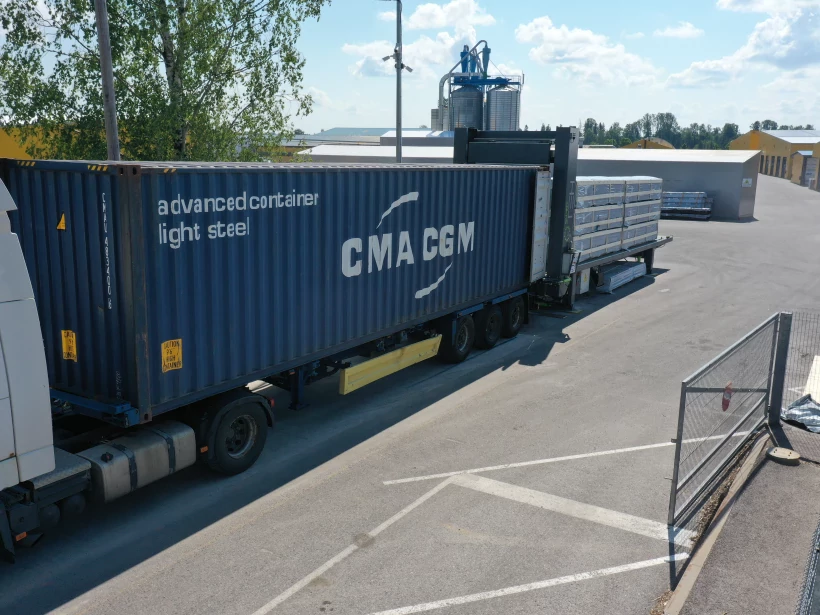
Loading a shipping container isn’t just about stacking boxes – poor planning can lead to wasted space, damaged cargo, and costly delays.
Read this guide for proven tips on how to load a shipping container faster, safer, and more efficiently.
- Plan before you load: Accurate measurements, the right container choice, and a solid load plan save time, prevent costly mistakes, and protect cargo.
- Optimize space and balance weight: Smart stacking, even weight distribution, and securing fragile items reduce damage risks and maximize container capacity.
- Prioritize safety and compliance: Follow safety protocols, international shipping standards, and weight regulations to avoid fines, delays, and workplace accidents.
- Leverage technology: Use load-planning software, smart sensors, freight platforms, and automated loading systems to boost efficiency and lower costs.
Why efficient container loading matters
Efficient loading drives lower costs, faster deliveries, safer operations, and more sustainable shipping.
Cost savings
Globally, shipping containers are underfilled by an average of 35%. Maximizing capacity can save you thousands each month and keep your business competitive.
Time efficiency
Only 60% of port time goes to actual cargo operations – the rest is often lost to handovers and waiting. With a solid loading plan and the right equipment, you’ll cut turnaround times and avoid costly demurrage fees.
Cargo safety
Proper weight distribution, bracing, and securing reduce the risk of cargo shifting or damage during transit. How you load matters as much as what you load, especially for long-haul shipping.
Workplace safety
Overloaded or poorly balanced containers can be dangerous to handle. Safe loading techniques reduce manual handling, minimize accidents, and protect both staff and shippers.
Sustainability
Efficient loading means fewer containers shipped, lower fuel consumption, and reduced carbon emissions, helping you stay compliant with growing sustainability targets.
Prepare before you load
Successful container loading begins long before the first boxes are lifted. Smart preparation saves time, protects cargo, and maximizes space.
Measure and plan
Get accurate cargo dimensions, weight, and volume. Accurate measurements help plan stacking, balance weight, and reduce empty space.
Pro tip: Create a detailed cargo manifest with exact dimensions (LxWxH), weight, fragility ratings, and packaging type. It prevents costly restuffing and delays at the port.
Check weight limits and shipping regulations to avoid fines or being held liable for safety violations.
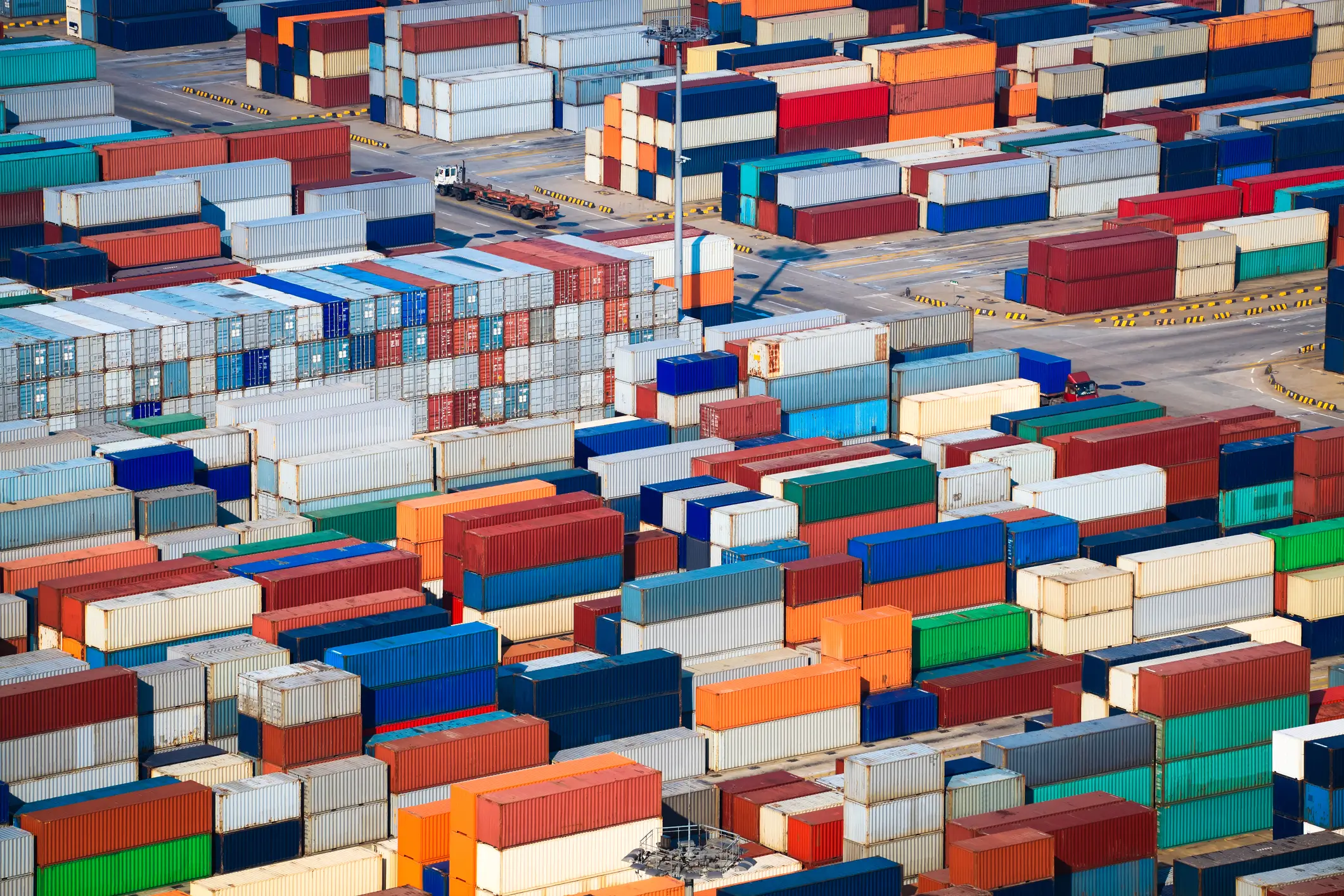
Choose the right container
Picking the right container upfront avoids last-minute swaps, delays, or damage during transit and ensures compliance with destination country rules:
- Dry cargo containers: Standard goods, electronics, textiles, auto parts, etc.
- High cubes: Lightweight, bulky cargo like furniture or machinery
- Flat racks: Oversized equipment, vehicles, construction gear
- Open tops: Tall cargo loaded by crane
- Refrigerated containers: Temperature-sensitive goods like food, chemicals, and pharma
Consider the type of load, ventilation, temperature requirements, and storage conditions.
Inspect the container before loading:
- Floor integrity (no holes, soft spots, or protruding nails)
- Wall and roof condition (no dents, holes, or rust)
- Door seals and locking mechanisms
- Cleanliness and absence of odors or residue
Organize your cargo
Group items by weight, size, and fragility. Place heavier items on the floor for stability and secure delicate items with packing materials, pallets, or other supports.
Organizing in advance reduces mid-load adjustments and keeps goods intact until the final destination.
Use a load plan
A visual plan saves hours and prevents wasted space. Use load-planning software to calculate stacking, weight distribution, and securing points. Even a simple sketch or diagram helps minimize shifting risks and wasted space.
A solid plan should include:
- Item placement order
- Weight distribution map
- Securing point locations
- Unloading access needs
- Special handling instructions
Best practices for loading a shipping container
The right techniques improve safety, efficiency, and cost-effectiveness. Follow these best practices to optimize your loading process and avoid common mistakes.
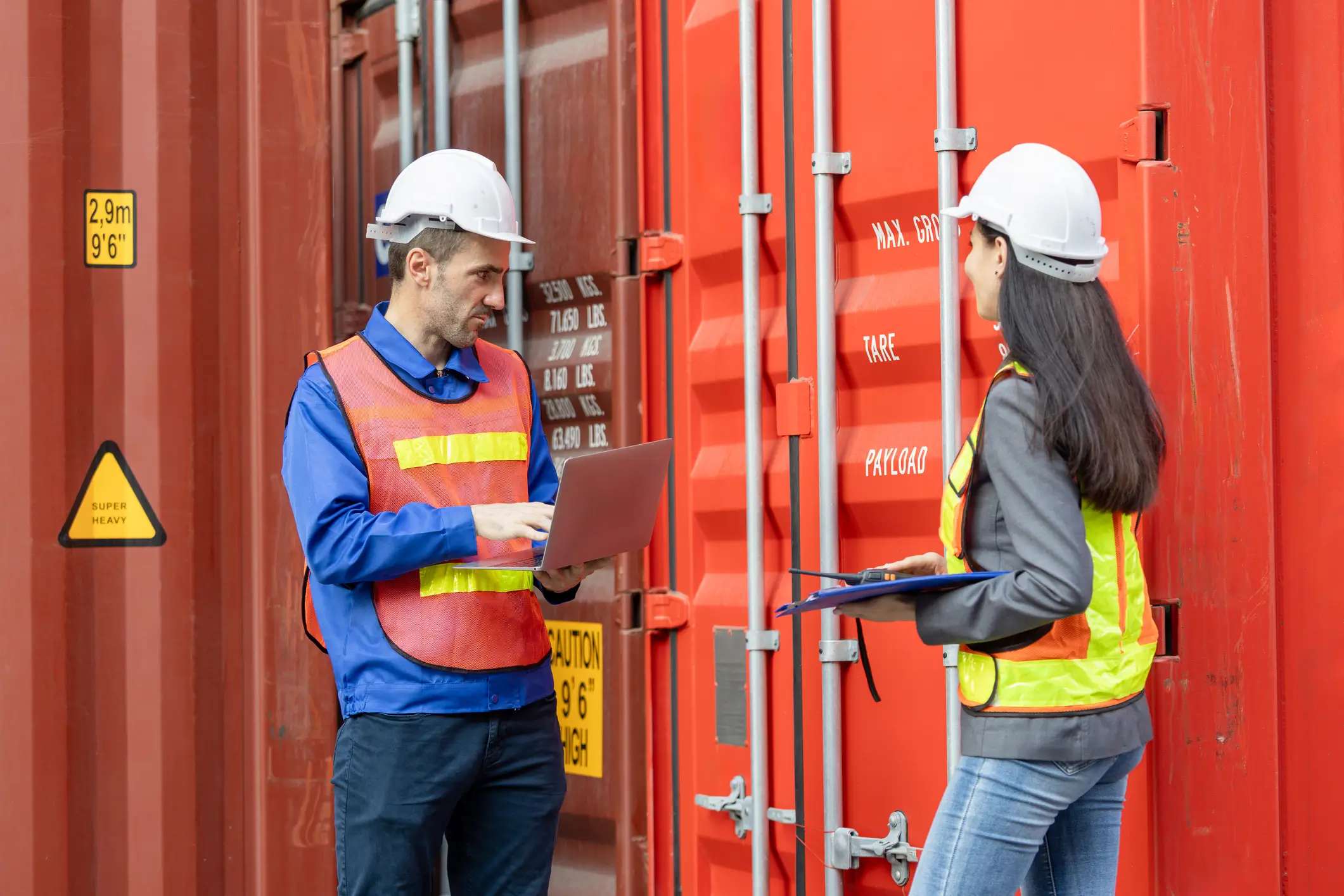
Start with the heaviest items
Load the heaviest cargo first, placing it on the bottom and near the container’s center of gravity. This method creates a stable base, prevents shifting, and reduces tipping risks.
Guidelines:
- Keep heavy items within the middle third of the container.
- Follow the CTU Code: no more than 60% of the total weight in half of the container length.
- Distribute across the full width when possible.
Heavy machinery, raw materials, and palletized bulk goods should go in first before lighter cargo.
Distribute weight evenly
Avoid stacking all heavy items on one side, as this can cause tipping, shifting, or uneven stress on the container floor.
Spread weight evenly front-to-back and side-to-side to maintain stability during loading, unloading, and transport by truck or trailer. Balanced weight reduces safety hazards and protects both the cargo and the container.
Secure fragile cargo
About 65% of damaged cargo claims result from poor packing within containers. Use dunnage, padding, straps, or bracing to secure delicate goods and prevent them from moving.
Glassware, electronics, furniture, and other sensitive goods should always be stabilized, especially when they’ll ship long distances.
Maximize vertical space
Use the container’s full height without compromising safety. Stack boxes and pallets carefully, keeping heavier items on the bottom. Use locking patterns to keep stacks stable and minimize movement.
Proper stacking increases space efficiency, reduces the number of trips needed, and lowers freight shipping costs.
Prevent moisture and contamination
Protect cargo from humidity, pests, and contamination:
- Use desiccants, pallets, and ventilation for moisture-sensitive goods.
- Keep cargo off the floor to prevent mold and corrosion.
- Inspect containers for leaks, damp spots, and residue, especially when shipping food or hazardous materials.
Follow safety protocols and procedures
Pre-loading checklist:
- Ensure the loading dock is level and secure
- Set container brakes and truck wheel chocks
- Verify loading equipment is certified and operational
- Require PPE for all personnel
- Establish clear communication among the team
During loading:
- Follow manual lifting guidelines (NIOSH recommends max 23kg/51lbs)
- Use mechanical aids for heavier, hard-to-carry items
- Keep walkways clear and well-lit
- Adhere to your organization's safety policies and local regulations
Comply with international standards
Incorrect container stuffing can cause fines, delays, or rejected shipments. Follow key regulations and standards:
- CTU Code: Safe container stuffing and securing
- SOLAS VGM: Verified Gross Mass must be declared before vessel loading
- IMDG Code: Safe handling of hazardous goods
- Customs rules: Accurate documentation and cargo declarations
Compliance checklist:
- Cargo weight verified and documented
- Dangerous goods classified and segregated
- Load securement meets CTU Code standards
- All documentation is complete and accurate
- Container seals applied and recorded
Tools for efficient container stuffing
The right technology can help you load faster, use space smarter, and protect your cargo while keeping costs under control. Here are four powerful tools that make a real difference.
Load-planning software
Tools like Cargo-Planner and EasyCargo help you visualize your container layout before loading begins. They analyze dimensions, weight, and volume to calculate the most efficient stacking strategy.
With these tools, you can:
- Maximize floor space and vertical stacking
- Avoid exceeding weight limits
- Prevent costly last-minute repacking
- Generate clear step-by-step loading instructions for your team
Internet of Things sensors
Smart sensors give you real-time visibility into container conditions and cargo data during loading and transport.
They help you:
- Track total weight to prevent overloading
- Detect shifting risks before damage occurs
- Monitor temperature and humidity for sensitive goods
- Receive instant alerts if thresholds are breached
Digital freight platforms
Coordinating with multiple carriers can get messy. Digital freight platforms centralize bookings, scheduling, and communication in one place for smoother operations.
These services enable you to:
- Instantly compare carrier rates and availability
- Automate booking confirmations and updates
- Track shipments in real time
- Reduce email chains and manual admin work
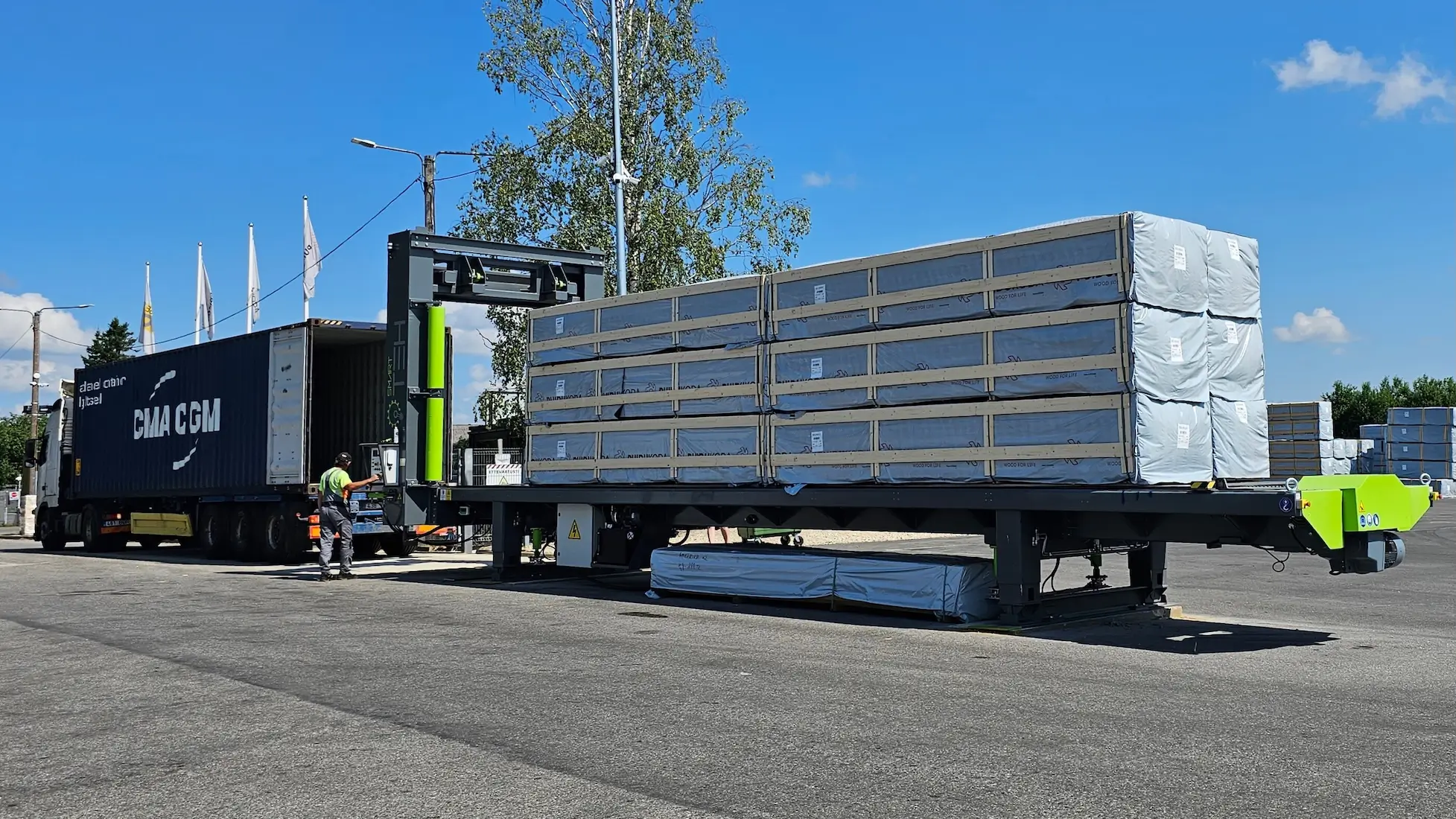
Automated container loading systems
When you’re dealing with high cargo volumes, increasing shipping costs, and tight deadlines, manual container loading can quickly become a bottleneck.
For businesses shipping at scale, automated container loading systems are a game-changer. These machines load goods directly into containers with precision and consistency.
Key benefits:
- Speed: Load up to 3x faster than manual methods
- Safety: Reduce manual handling and workplace injury risks
- Capacity: Fit more cargo per container by controlling placement
- Cost savings: Cut labor expenses and minimize demurrage fees
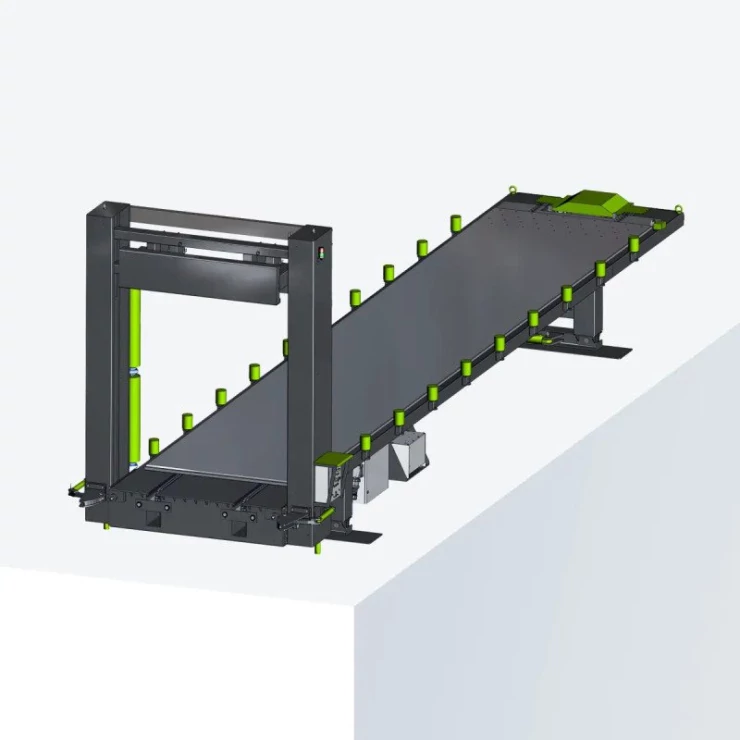
Automatic Container Loading System
Final checklist for an efficient loading process
Before you load your next container, run through this quick checklist to ensure a smooth, safe, and cost-effective shipment:
- Plan ahead. Measure cargo dimensions, weight, and volume.
- Choose the right container. Match container type to cargo and inspect for damage or contamination.
- Load heavy items first. Place them at the bottom and near the center for stability.
- Distribute weight evenly. Avoid tipping risks and comply with safety regulations.
- Secure fragile goods. Use padding, pallets, straps, and dunnage.
- Use the right tools. Load-planning software and automated loading systems can boost efficiency.
Efficient container loading combines planning, proven techniques, the right technology, and continuous improvement. Following these best practices ensures cargo is protected, space is maximized, and shipments are delivered safely and on time.
FAQ: Container loading
What are common mistakes to avoid when loading a container?
- overloading beyond weight limits,
- uneven weight distribution causing stability issues,
- inadequate protection for fragile items,
- leaving empty spaces that waste money,
- using the wrong container type for specific cargo,
- and failing to comply with international shipping regulations.
Each of these can result in delays, damage, additional costs, or regulatory penalties.
How do I prevent cargo from shifting during transit?
The key is creating a tight, stable load where items support each other and cannot move independently.
Are there regulations I need to follow when loading containers?
The CTU Code provides comprehensive loading and securing standards, and SOLAS Verified Gross Mass requirements mandate accurate weight declaration. Destination country customs regulations must be followed, and dangerous goods require special handling per the IMDG Code.
Non-compliance can result in container rejection, fines, and significant shipping delays.
Can hazardous goods be shipped in the same container as other cargo?
Hazardous materials must be properly classified, segregated according to compatibility tables, packaged in UN-approved containers, labeled with appropriate hazard symbols, and documented with detailed shipping papers.
Many hazardous items cannot be mixed with food, pharmaceuticals, or certain other materials. Always consult current regulations and consider hiring a dangerous goods specialist.
How do you unload a shipping container efficiently?
Unload in reverse order of loading (heaviest items last), maintain container balance by removing items evenly from both sides, check each item against the packing list, use appropriate equipment for heavy items, and handle fragile goods with extra care.
Document any damage immediately with photos for insurance claims.



